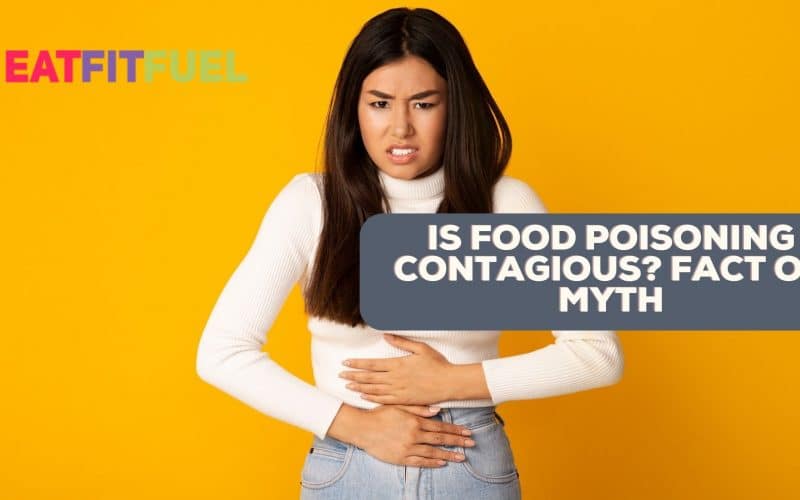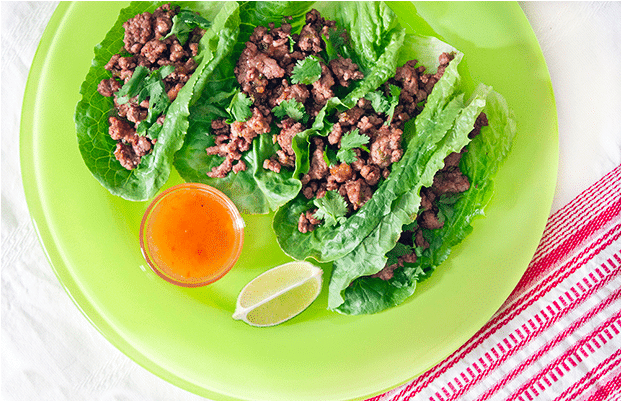If you frequently take chances on your food, there is a high chance that you have suffered from stomach cramps, diarrhea, dehydration, or vomiting.
This is usually the cause of food poisoning, but food poisoning is an umbrella term for ailments caused by foodborne germs.
If someone close to you gets food poisoning, are they contagious? Do you have the chance of getting food poisoning?
The answer is entirely dependent on various factors. Predominantly, it depends on the type of food poisoning.
In this article, let’s see is food poisoning contagious and look at the causes, symptoms, and prevention methods for food poisoning.
What Is Food Poisoning?
Food poisoning, also known as a foodborne illness, results from consuming contaminated food or drink.
Contaminated food means that the food is exposed to toxic organisms such as viruses, bacteria, or parasites.
Even consuming contaminated food that contains the byproducts of these toxic organisms can cause food poisoning.
The most common symptoms of food poisoning are vomiting, diarrhea and fever. This is the defense mechanism of your body to purge all the toxic products from contaminated foods.
Food poisoning can also be caused by food items, such as raw fruits and vegetables, as well as raw eggs, poultry, seafood, and meat.
Difference Between Food Poisoning and Stomach Flu
Food poisoning is caused by viruses, bacteria, and parasites in contaminated foods and drinks.
The stomach flu is also a gastrointestinal infection that causes inflation in the small intestine and stomach. It is a sign that your immune system is fighting against the infection.
Vomiting and diarrhea are common symptoms in both of these infections. The main difference is that food poisoning comes from consuming contaminated food.
Whereas you can catch a stomach bug from various sources. Sometimes, it might occur without any specific reasons.
While the symptoms are usually the same, the stomach flu is often less severe when compared to food poisoning.
It usually lasts for 1 to 3 days. Depending on the virus strain, you could be contagious for a few days to 2 weeks.
Symptoms of Food Poisoning
Food poisoning symptoms can range from mild to severe based on the contamination of your food or drink.
The symptoms might start right a few hours after the consumption of contaminated food or after several weeks.
The following are some of the most common food poisoning symptoms:
- Nausea.
- Vomiting.
- Loss of appetite.
- Diarrhea.
- Abdominal cramps.
- Stomach cramps.
- Fatigue.
- Fever.
- Muscle aches over the entire body.
Since vomiting and diarrhea can cause dehydration, you should seek medical attention if you are showing signs of dehydration.
The Different Types of Food Poisoning
Food poisoning can be caused by one of the following reasons since it is a catch-all name for many foodborne illnesses. It is classified depending on the cause of food poisoning.
Food Poisoning from Bacteria
When food is contaminated by bacteria and survives ingestion, it can continue to multiply in the stomach.
The toxins that the bacteria produce can also be life-threatening.
Food Poisoning from Viruses
Viruses can stay alive on the food and are easily transmitted to humans. They are the most common causes of food poisoning.
These viruses can be very contagious and pose a problem for people with weak immune systems.
Food Poisoning from Parasites
Parasites are less common when compared to bacteria or viruses. They are dangerous as they can live in the digestive tract for years without being detected.
The symptoms of a foodborne illness from parasites include nausea, diarrhea, and vomiting.
What Are the Common Causes of Food Poisoning?
We know that contamination of our food causes food poisoning, but there are various ways for food to get contaminated.
The following are some of the most common causes of food poisoning:
Norovirus
Norovirus is the most common cause of foodborne illnesses.
It is easy to identify since you develop symptoms within 12 hours of ingesting contaminated food.
The usual symptoms include projectile vomiting, diarrhea, and cramps.
Norovirus is highly contagious and can easily spread from the infected person. Added to that, it is also hard to kill.
It can even survive at temperatures above 145°F and as low as -112°F. It is resistant to ordinary sanitation methods, like soaps and hand sanitizers, making it hard to purge.
E. coli
E. coli is also known as Escherichia coli. While this bacteria is a normal part of our gut bacteria. Some variants of it might cause food poisoning.
This bacteria is usually found in contaminated water and foods. Unpasteurized milk, uncooked lettuce, raw meats, and raw sprouts are the primary source of this bacteria.
E. coli can be easily prevented by adequately handling food. Washing hands before cooking, pasteurizing milk, and cooking the food can help prevent E. coli outbreaks.
Salmonella
Salmonella infection is caused by consuming contaminated water or foods. The infected person develops symptoms as early as 6 hours after consumption.
The symptoms include nausea, diarrhea, fever, cramps, and vomiting and can usually last from a few days to a week.
Salmonella is usually found in foods such as unwashed fruits and vegetables, meat, poultry, and eggs.
Hepatitis A
Hepatitis A is another foodborne illness that is highly contagious. It causes inflation of the liver, which can lead to food poisoning symptoms.
The symptoms might appear after 2 to 7 weeks of food consumption. It can go on for almost 2 months.
Luckily, there are vaccines for hepatitis A. The vaccines can prevent infection if you feel at risk of getting Hepatitis A.
Is Food Poisoning Contagious?
To revisit the earlier question, the answer heavily depends on what kind of food poisoning you are experiencing.
Norovirus causes food poisoning, is highly contagious, and can easily pass from person to person.
The main reason for food poisoning outbreaks is because people expose themselves to an infected person’s bodily fluids (diarrhea and vomit).
This is also the reason for the occurrences of these outbreaks in densely populated areas.
On the other hand, food poisoning caused by toxins and chemicals is not contagious and can only be caused through direct consumption of contaminated food and water.
So, food poisoning is contagious, but only in some instances.
How to Prevent Food Poisoning?
The following are some of the preventive measures for food poisoning:
- First and foremost, handle food preparation carefully. Always keep the perishable foods stored in a dry and cool place.
- When handling fruits and vegetables, always wash them thoroughly and remove surface-level contaminants.
- Cook meat, poultry, and seafood at the right temperature. Also, keep cooked and raw meat separated to avoid cross-contamination.
- Always buy pasteurized dairy products, such as cheese, butter, and milk.
- Wash your hands frequently and ensure that you use proper safety measures when cooking in a crowded place.
- Beware of consuming food that has not been properly refrigerated. Avoid consuming any food if you do not know how it was prepared.
- High-risk foods, such as milk, mayonnaise, poultry, meat, seafood, and eggs are common ingredients in many diets. Ensure that they are properly handled when cooking.
- If you are away from home, pay close attention to how your food is being prepared.
Frequently Asked Questions
What is the main reason for food poisoning?
The reason for food poisoning is the consumption of food and water that are contaminated by toxic organisms, such as viruses, bacteria, and parasites.
What are the signs of food poisoning?
The following are some of the signs of food poisoning:
- Nausea.
- Vomiting.
- Loss of appetite.
- Diarrhea.
- Abdominal cramps.
- Stomach cramps.
- Fatigue.
- Fever.
- Muscle aches over the entire body.
3. Who are people with more risk of food poisoning?
The following people possess a greater risk for food poisoning:
- Adults aged 65 and above.
- Children younger than 5 years.
- Pregnant women.
- People with weakened immune systems.
Final Thoughts
Foodborne illnesses can occur from various sources. It is necessary to pay attention to what we consume and give extra care to the food preparation methods. While food poisoning is treatable, it is better to avoid any foodborne illness. If you start developing symptoms similar to food poisoning, ensure that you stay hydrated and consult a doctor if the signs continue.
To know the latest in health, wellness, and diet, subscribe to our free newsletter.
Boosting Your Immune System by Transforming Fear into Gratitude
Bloated After Working Out? How to Prevent & Deal with Post-Workout GI Distress






